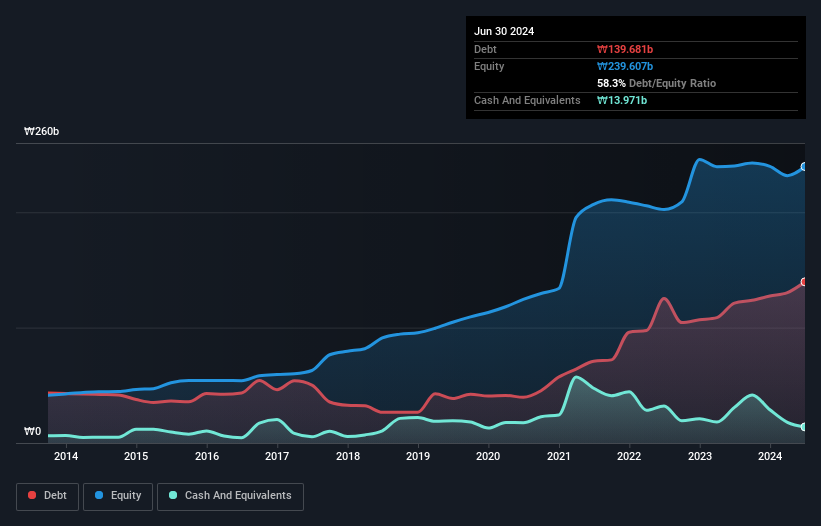- South Korea
- /
- Semiconductors
- /
- KOSDAQ:A036810
We Think Fine Semitech (KOSDAQ:036810) Has A Fair Chunk Of Debt
David Iben put it well when he said, 'Volatility is not a risk we care about. What we care about is avoiding the permanent loss of capital.' So it seems the smart money knows that debt - which is usually involved in bankruptcies - is a very important factor, when you assess how risky a company is. We note that Fine Semitech Corp. (KOSDAQ:036810) does have debt on its balance sheet. But the real question is whether this debt is making the company risky.
When Is Debt A Problem?
Debt is a tool to help businesses grow, but if a business is incapable of paying off its lenders, then it exists at their mercy. In the worst case scenario, a company can go bankrupt if it cannot pay its creditors. However, a more usual (but still expensive) situation is where a company must dilute shareholders at a cheap share price simply to get debt under control. Of course, the upside of debt is that it often represents cheap capital, especially when it replaces dilution in a company with the ability to reinvest at high rates of return. When we examine debt levels, we first consider both cash and debt levels, together.
See our latest analysis for Fine Semitech
How Much Debt Does Fine Semitech Carry?
As you can see below, at the end of June 2024, Fine Semitech had ₩139.7b of debt, up from ₩121.3b a year ago. Click the image for more detail. On the flip side, it has ₩14.0b in cash leading to net debt of about ₩125.7b.

How Healthy Is Fine Semitech's Balance Sheet?
The latest balance sheet data shows that Fine Semitech had liabilities of ₩114.9b due within a year, and liabilities of ₩70.4b falling due after that. Offsetting this, it had ₩14.0b in cash and ₩38.3b in receivables that were due within 12 months. So its liabilities outweigh the sum of its cash and (near-term) receivables by ₩133.0b.
This deficit isn't so bad because Fine Semitech is worth ₩477.9b, and thus could probably raise enough capital to shore up its balance sheet, if the need arose. However, it is still worthwhile taking a close look at its ability to pay off debt. There's no doubt that we learn most about debt from the balance sheet. But it is Fine Semitech's earnings that will influence how the balance sheet holds up in the future. So when considering debt, it's definitely worth looking at the earnings trend. Click here for an interactive snapshot.
In the last year Fine Semitech had a loss before interest and tax, and actually shrunk its revenue by 9.2%, to ₩200b. We would much prefer see growth.
Caveat Emptor
Importantly, Fine Semitech had an earnings before interest and tax (EBIT) loss over the last year. Indeed, it lost ₩12b at the EBIT level. When we look at that and recall the liabilities on its balance sheet, relative to cash, it seems unwise to us for the company to have any debt. Quite frankly we think the balance sheet is far from match-fit, although it could be improved with time. However, it doesn't help that it burned through ₩59b of cash over the last year. So in short it's a really risky stock. When analysing debt levels, the balance sheet is the obvious place to start. But ultimately, every company can contain risks that exist outside of the balance sheet. For instance, we've identified 3 warning signs for Fine Semitech (2 don't sit too well with us) you should be aware of.
If you're interested in investing in businesses that can grow profits without the burden of debt, then check out this free list of growing businesses that have net cash on the balance sheet.
New: AI Stock Screener & Alerts
Our new AI Stock Screener scans the market every day to uncover opportunities.
• Dividend Powerhouses (3%+ Yield)
• Undervalued Small Caps with Insider Buying
• High growth Tech and AI Companies
Or build your own from over 50 metrics.
Have feedback on this article? Concerned about the content? Get in touch with us directly. Alternatively, email editorial-team (at) simplywallst.com.
This article by Simply Wall St is general in nature. We provide commentary based on historical data and analyst forecasts only using an unbiased methodology and our articles are not intended to be financial advice. It does not constitute a recommendation to buy or sell any stock, and does not take account of your objectives, or your financial situation. We aim to bring you long-term focused analysis driven by fundamental data. Note that our analysis may not factor in the latest price-sensitive company announcements or qualitative material. Simply Wall St has no position in any stocks mentioned.
About KOSDAQ:A036810
Fine Semitech
Develops and supplies products to semiconductor and FPD industries in South Korea and internationally.
Low risk with questionable track record.
Market Insights
Community Narratives





